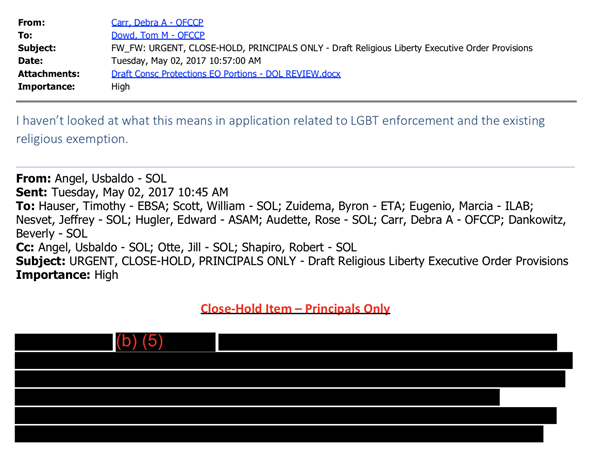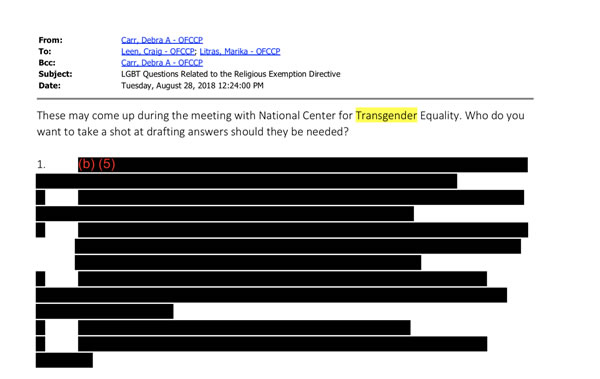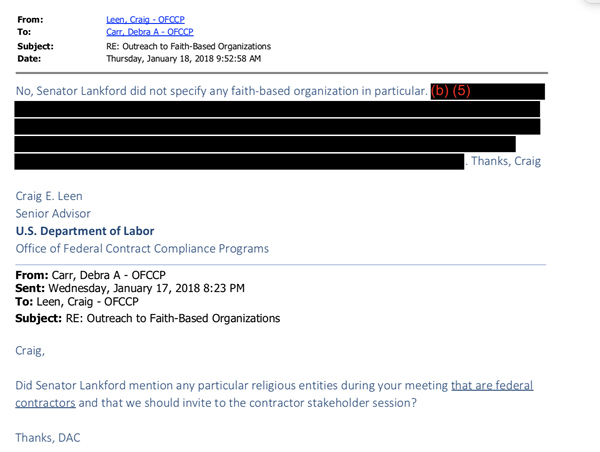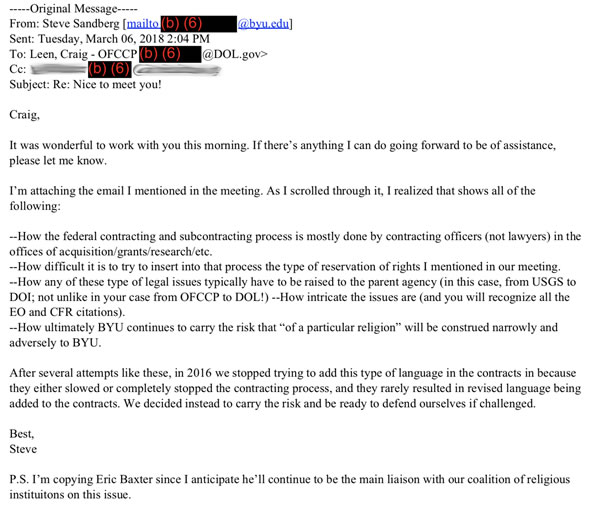homepage news
Feds hastily make religious carve-outs to regulations before Trump’s exit
FOIA dump reveals differing views on scope for exemptions


With time running out for the Trump administration, federal agencies are hurriedly finalizing regulations granting leeway to religious institutions that are federal grantees and contractors, which critics say — and internal emails the Washington Blade obtained exclusively through a FOIA lawsuit suggest — blur the line between church and state and would enable anti-LGBTQ discrimination.
Two religious freedom rules that have gone into effect within the past two weeks — in addition to an initial production of emails sought by the Blade obtained under the Freedom of Information Act — confirms restructuring federal regulations to grant more leeway to religious institutions has been a central focus of the Trump administration throughout its four years.
Rachel Laser, CEO of Americans United for Separation of Church & State, said in a statement to the Blade she’s “disappointed, though not surprised” the Trump administration would act quickly to make these regulations final in lame duck before Trump leaves the White House.
“President Trump spent four long years pandering to his Christian nationalist base, which has too often succeeded at securing government policies that open the door to religion-based discrimination against LGBTQ people, women, religious minorities, nonreligious people and others,” Laser said. “These policies are a last-gasp effort by the outgoing administration to ignore the will of the people who rejected Trump’s policies on Nov. 3.”
One rule the Department of Labor made final last week, a proposed regulation that had been pending since August 2019, expanded the religious carve-out in rules prohibiting discrimination in employment practices, essentially allowing any federal contractor to claim an exemption to engage in workplace discrimination, including anti-LGBTQ discrimination. (Federal contractors are still barred from workplace discrimination under Title VII of the Civil Rights Act of 1964.)
On Monday, the Trump administration followed up by making final a whopping 400-page, nine-agency rule that has been pending since January instructing federal contractors to disperse grants and sub-grants to churches and religious organizations as well as secular groups.
Previously, there had to be secular alternatives available for indirect providers of social services, such as food kitchens or homeless shelters, if they require participation in religious activities as a condition of receiving services. Also, direct providers of services had to provide notice that beneficiaries are entitled to secular providers if they prefer, and have referrals available to secular alternatives for the services they provide.
The Trump administration’s changes lift the notice and referral requirement for direct service providers as well as the need for secular alternatives when the funding goes indirectly to providers who require participation in religious activities. The LGBTQ legal group Lambda Legal criticized the rule change in a statement as “elevating ultra-conservative religious interests above everyone else’s basic rights.”
Because these regulations went through a rule-making process, the Biden administration won’t be able to easily undo them under the Administrative Procedure Act, which requires the U.S. government to undertake a deliberative process and engage with the public before making regulatory changes. It would take another rule-making process or several months or more than a year to undo them.
White House Deputy Press Secretary Judd Deere defended federal agencies making these rules final before Trump leaves office.
“The American people elected Donald Trump as president for a four-year term, not until Nov. 3, 2020,” Deere said. “President Trump’s first term goes until Jan. 20, 2021 as prescribed by the U.S. Constitution and he has every right to continue to advance policies that fulfill the commitments and promises he made to the country just as every president before him has done.”
FOIA dump reveals differing views on religious carve-outs
The Blade’s FOIA lawsuit, which was filed September in the District Court of D.C. and sought internal emails with words “religion” and “religious” from the Labor Department’s Office of Federal Contract Compliance Programs, yielded its first results last week.
The emails reveal Debra Carr, who has been serving as director of policy for OFCCP, appeared to want nothing to do with regulatory changes proposed by Trump political appointees and signaled that view — sometimes gently, sometimes not so gently — in the email chains.
According to her bio, Carr joined OFCCP after serving as an attorney for the U.S. Commission on Civil Rights. Among the reports she wrote were those evaluating the Native American healthcare system and the need to reauthorize the Indian Healthcare Improvement Act; assessing the effectiveness of the No Child Left Behind Act; and reviewing the usefulness of Executive Order 12898 and Title VI as tools for achieving environmental justice.
Carr also worked as a civil rights lawyer at the U.S. Justice Department White House office and headed a White House office representing the United States at the United Nations on issues related to racism and xenophobia, her bio says.

In response to language for a proposed 2017 executive order President Trump would sign on religious liberty, Carr, when pressed for input, writes in an email dated May 2, 2017: “I haven’t looked at what this means in application related to LGBT enforcement and the existing religious exemption.”
In an earlier part of the email chain, Carr says she and the solicitor of labor agree on some language components, but instructs officials she “won’t sign off unless you clear these joint comments.” Carr adds if that language isn’t cleared she “will reply ‘no comment, defer to SOL for legal opinion’ or just ‘no comment.’”
The clearance Carr sought, however, apparently never came. In a subsequent email, Carr makes good on her threat and writes, “OFCCP has no programmatic comment but defers to SOL for substantive legal review and comment.”
In a separate exchange, Carr expresses displeasure after she received as part of the comment process for rule changes an email from Ché Walker, who identifies as “Citizen of the United States of America” and urges the Labor Department not to change regulations to allow religious institutions that accept federal money to engage in discriminatory practices.
“Not sure why I got this,” writes Carr. When a staffer explains to her it came to her in error and should be directed elsewhere in the Labor Department, Carr replies, “This is the second one.”
The staffer replies OFFCP is coming up with “a blanket response” to allow her to point respondents to the right portal, but Carr wasn’t having it.
“Sorry, no time to reply to them I’ve got enough email in my inbox to get through,” Carr writes. “As long as the NPRM is correct you guys are covered.”
The Labor Department didn’t respond to a request for comment for this article, nor did Carr through the Labor Department.
Many emails in the 175-page initial production are heavily redacted. The Labor Department concealed personal contact information and cited deliberative language claims to redact other content.
FOIA, however, was amended in 2016 to clarify federal agencies cannot redact deliberative language without demonstrating revealing that information would cause “foreseeable harm.” The Blade, represented by attorneys at the Reporters Committee for Freedom of the Press, will have the opportunity to challenge these redactions once the FOIA production is complete.
One such heavily redacted email reveals OFCCP was planning to have a meeting with the National Center for Transgender Equality on Aug. 28, 2018. That would have been shortly after the Labor Department issued a memo seeking to bring regulations in compliance with the U.S. Supreme Court’s decision in the Masterpiece Cakeshop case, which critics at the time said was unnecessary because the narrow ruling applied only to the specifics of that case.
Carr alerts OFFCP officials, including OFFCP Director Craig Leen, to potential issues NCTE may bring up at the meeting, but those talking points are completely redacted in the FOIA production. NCTE didn’t respond to repeated requests from the Blade to comment on this planned meeting.

A transgender advocate familiar with the meeting, who spoke on condition of anonymity, said other LGBTQ and civil rights groups were in the meeting, which was focused on the 2018 directive.
“As I recall, the directive was incredibly vague and sweeping in its language so we came with a bunch of tough questions, which may have been what this email was about,” the advocate said. “Those questions would’ve been pretty much along the lines of what was aired in comments on the rule that they just finalized.”
The transgender advocate said Leen was “still pretty new there,” so part of the meeting was to “get a sense of how bad he would be, and make sure he understood the legal and political risks of going backwards -— as advocates often do when new agency leaders come in whom they can presume to be hostile to their priorities.”
The FOIA dump also reveals Sen. James Lankford (R-Okla.), a longtime opponent of LGBTQ non-discrimination policies who this year cited J.K. Rowling on the Senate floor to block consideration of the Equality Act, has been the driving force pushing the Trump administration to adopt more expansive religious exemptions.
One Feb. 18, 2018 email from an OFFCP staffer details the correspondence between Lankford’s staff and the agency. According to the email, Lankford sent a letter in June 2017 on the scope of the religious exemption for federal contractors, then when OFFCP responded, Lankford’s legislative counsel, Sarah Seitz, responded in July 2017 “she had concerns and questions with the response.”
After former U.S. Attorney General Jeff Sessions issued in October 2017 guidance directing federal agencies to include religious liberties in enforcement of laws and policies, including non-discrimination provisions, Seitz sent another letter seeking clarification on the same religious exemption in light of the guidance, the email says.
Additional correspondence followed, as well as a meeting between OFFCP officials and Lankford staff on Jan. 17, 2018, and another meeting that was tentatively planned for March 6, 2018, the email says.
Despite Lankford’s push to expand the religious exemption for federal contractors, additional emails in the FOIA dump reveal the agency and the senator had difficulty identifying a single religious institution that wanted the change, or at least publicly wanted to be the face of it.

In response, a Jan. 17, 2018 email from one staffer who wanted “to ensure all faith-based organizations that are contractors/potential contractors are invited” to the Lankford meeting, another staffer asks if the senator had mentioned “any particular religious entities during your meeting that are federal contractors and that we should invite to the contractor stakeholder session.”
“No, Sen. Lankford did not specify any faith-based organization in particular,” the OFCCP staffer replied, then continued with language the Labor Department redacted in the FOIA dump as deliberative.
Lankord’s office didn’t respond to the Blade’s request to comment on why the senator has been so insistent on pushing for religious exemptions.
One religious institution revealed in the FOIA dump to have come forward to a suggest a desire for an expanded exemption under non-discrimination regulations was Brigham Young University, which has a history of anti-LGBTQ discrimination.
Steven Sandberg, deputy general counsel for BYU, appears in a March 6, 2018 email to test the waters to see how far it can get with the religious exemption by complaining its contracts are “mostly done by contracting officers (not lawyers) in the offices of acquisition/grants/research/etc.”
“After several attempts like these, in 2016 we stopped trying to add this type of language in the contracts in because they either slowed or completely stopped the contracting process, and they rarely resulted in revised language being added to the contracts,” Sandberg wrties. “We decided instead to carry the risk and be ready to defend ourselves if challenged.”
Sandberg points out the religious exemption to employment non-discrimination rules for federal contractors during the Obama years allowed religious institutions to favor co-religionists in hiring practices. Suggesting BYU interprets that exemption broadly in a way that might conflict with rules, including LGBTQ non-discrimination requirements, Sandberg writes, “BYU continues to carry the risk that ‘of a particular religion’ will be construed narrowly and adversely to BYU.”
Copied on the email exchange is a lawyer for Becket Law, a legal firm that seeks to enhance religious liberty claims and currently has pending before the U.S. Supreme Court a case that seeks a First Amendment right for Catholic Social Services to reject same-sex couples in taxpayer-funded foster care despite having signed a contract vowing not to engage in anti-LGBTQ discrimination.
Brigham Young University didn’t respond to a request for comment for this article, nor did the Becket Law firm.

More religious carve-outs could be on the way
Additional opportunities remain for the Trump administration to finalize rules weakening non-discrimination requirements in the name of religious freedom.
One pending regulation, if made final, would eliminate an Obama-era requirement that recipients of federal grants adhere to non-discrimination principles, effectively allowing these grantees to discriminate in adoption and health care settings against LGBTQ people. The Trump administration proposal would allow adoption agencies that receive federal funds to refuse to place children with same-sex parents.
Another regulation, proposed by the Department of Housing & Urban Development in July, would weaken Obama-era regulations to allow taxpayer-funded homeless shelters to refuse to accept transgender people seeking refuge consistent with their gender identity, including on the basis of religious grounds. Rep. Jennifer Wexton (D-Va.) has been outspoken against the proposal.
It remains to be seen whether the Trump administration will make final either regulation. The White House had no comment.
homepage news
Honoring the legacy of New Orleans’ 1973 UpStairs Lounge fire
Why the arson attack that killed 32 gay men still resonates 50 years later

On June 23 of last year, I held the microphone as a gay man in the New Orleans City Council Chamber and related a lost piece of queer history to the seven council members. I told this story to disabuse all New Orleanians of the notion that silence and accommodation, in the face of institutional and official failures, are a path to healing.
The story I related to them began on a typical Sunday night at a second-story bar on the fringe of New Orleans’ French Quarter in 1973, where working-class men would gather around a white baby grand piano and belt out the lyrics to a song that was the anthem of their hidden community, “United We Stand” by the Brotherhood of Man.
“United we stand,” the men would sing together, “divided we fall” — the words epitomizing the ethos of their beloved UpStairs Lounge bar, an egalitarian free space that served as a forerunner to today’s queer safe havens.
Around that piano in the 1970s Deep South, gays and lesbians, white and Black queens, Christians and non-Christians, and even early gender minorities could cast aside the racism, sexism, and homophobia of the times to find acceptance and companionship for a moment.
For regulars, the UpStairs Lounge was a miracle, a small pocket of acceptance in a broader world where their very identities were illegal.
On the Sunday night of June 24, 1973, their voices were silenced in a murderous act of arson that claimed 32 lives and still stands as the deadliest fire in New Orleans history — and the worst mass killing of gays in 20th century America.
As 13 fire companies struggled to douse the inferno, police refused to question the chief suspect, even though gay witnesses identified and brought the soot-covered man to officers idly standing by. This suspect, an internally conflicted gay-for-pay sex worker named Rodger Dale Nunez, had been ejected from the UpStairs Lounge screaming the word “burn” minutes before, but New Orleans police rebuffed the testimony of fire survivors on the street and allowed Nunez to disappear.
As the fire raged, police denigrated the deceased to reporters on the street: “Some thieves hung out there, and you know this was a queer bar.”
For days afterward, the carnage met with official silence. With no local gay political leaders willing to step forward, national Gay Liberation-era figures like Rev. Troy Perry of the Metropolitan Community Church flew in to “help our bereaved brothers and sisters” — and shatter officialdom’s code of silence.
Perry broke local taboos by holding a press conference as an openly gay man. “It’s high time that you people, in New Orleans, Louisiana, got the message and joined the rest of the Union,” Perry said.
Two days later, on June 26, 1973, as families hesitated to step forward to identify their kin in the morgue, UpStairs Lounge owner Phil Esteve stood in his badly charred bar, the air still foul with death. He rebuffed attempts by Perry to turn the fire into a call for visibility and progress for homosexuals.
“This fire had very little to do with the gay movement or with anything gay,” Esteve told a reporter from The Philadelphia Inquirer. “I do not want my bar or this tragedy to be used to further any of their causes.”
Conspicuously, no photos of Esteve appeared in coverage of the UpStairs Lounge fire or its aftermath — and the bar owner also remained silent as he witnessed police looting the ashes of his business.
“Phil said the cash register, juke box, cigarette machine and some wallets had money removed,” recounted Esteve’s friend Bob McAnear, a former U.S. Customs officer. “Phil wouldn’t report it because, if he did, police would never allow him to operate a bar in New Orleans again.”
The next day, gay bar owners, incensed at declining gay bar traffic amid an atmosphere of anxiety, confronted Perry at a clandestine meeting. “How dare you hold your damn news conferences!” one business owner shouted.
Ignoring calls for gay self-censorship, Perry held a 250-person memorial for the fire victims the following Sunday, July 1, culminating in mourners defiantly marching out the front door of a French Quarter church into waiting news cameras. “Reverend Troy Perry awoke several sleeping giants, me being one of them,” recalled Charlene Schneider, a lesbian activist who walked out of that front door with Perry.

Esteve doubted the UpStairs Lounge story’s capacity to rouse gay political fervor. As the coroner buried four of his former patrons anonymously on the edge of town, Esteve quietly collected at least $25,000 in fire insurance proceeds. Less than a year later, he used the money to open another gay bar called the Post Office, where patrons of the UpStairs Lounge — some with visible burn scars — gathered but were discouraged from singing “United We Stand.”
New Orleans cops neglected to question the chief arson suspect and closed the investigation without answers in late August 1973. Gay elites in the city’s power structure began gaslighting the mourners who marched with Perry into the news cameras, casting suspicion on their memories and re-characterizing their moment of liberation as a stunt.
When a local gay journalist asked in April 1977, “Where are the gay activists in New Orleans?,” Esteve responded that there were none, because none were needed. “We don’t feel we’re discriminated against,” Esteve said. “New Orleans gays are different from gays anywhere else… Perhaps there is some correlation between the amount of gay activism in other cities and the degree of police harassment.”

An attitude of nihilism and disavowal descended upon the memory of the UpStairs Lounge victims, goaded by Esteve and fellow gay entrepreneurs who earned their keep via gay patrons drowning their sorrows each night instead of protesting the injustices that kept them drinking.
Into the 1980s, the story of the UpStairs Lounge all but vanished from conversation — with the exception of a few sanctuaries for gay political debate such as the local lesbian bar Charlene’s, run by the activist Charlene Schneider.
By 1988, the 15th anniversary of the fire, the UpStairs Lounge narrative comprised little more than a call for better fire codes and indoor sprinklers. UpStairs Lounge survivor Stewart Butler summed it up: “A tragedy that, as far as I know, no good came of.”
Finally, in 1991, at Stewart Butler and Charlene Schneider’s nudging, the UpStairs Lounge story became aligned with the crusade of liberated gays and lesbians seeking equal rights in Louisiana. The halls of power responded with intermittent progress. The New Orleans City Council, horrified by the story but not yet ready to take its look in the mirror, enacted an anti-discrimination ordinance protecting gays and lesbians in housing, employment, and public accommodations that Dec. 12 — more than 18 years after the fire.
“I believe the fire was the catalyst for the anger to bring us all to the table,” Schneider told The Times-Picayune, a tacit rebuke to Esteve’s strategy of silent accommodation. Even Esteve seemed to change his stance with time, granting a full interview with the first UpStairs Lounge scholar Johnny Townsend sometime around 1989.
Most of the figures in this historic tale are now deceased. What’s left is an enduring story that refused to go gently. The story now echoes around the world — a musical about the UpStairs Lounge fire recently played in Tokyo, translating the gay underworld of the 1973 French Quarter for Japanese audiences.
When I finished my presentation to the City Council last June, I looked up to see the seven council members in tears. Unanimously, they approved a resolution acknowledging the historic failures of city leaders in the wake of the UpStairs Lounge fire.
Council members personally apologized to UpStairs Lounge families and survivors seated in the chamber in a symbolic act that, though it could not bring back those who died, still mattered greatly to those whose pain had been denied, leaving them to grieve alone. At long last, official silence and indifference gave way to heartfelt words of healing.
The way Americans remember the past is an active, ongoing process. Our collective memory is malleable, but it matters because it speaks volumes about our maturity as a people, how we acknowledge the past’s influence in our lives, and how it shapes the examples we set for our youth. Do we grapple with difficult truths, or do we duck accountability by defaulting to nostalgia and bluster? Or worse, do we simply ignore the past until it fades into a black hole of ignorance and indifference?
I believe that a factual retelling of the UpStairs Lounge tragedy — and how, 50 years onward, it became known internationally — resonates beyond our current divides. It reminds queer and non-queer Americans that ignoring the past holds back the present, and that silence is no cure for what ails a participatory nation.
Silence isolates. Silence gaslights and shrouds. It preserves the power structures that scapegoat the disempowered.
Solidarity, on the other hand, unites. Solidarity illuminates a path forward together. Above all, solidarity transforms the downtrodden into a resounding chorus of citizens — in the spirit of voices who once gathered ‘round a white baby grand piano and sang, joyfully and loudly, “United We Stand.”

Robert W. Fieseler is a New Orleans-based journalist and the author of “Tinderbox: the Untold Story of the Up Stairs Lounge Fire and the Rise of Gay Liberation.”
homepage news
New Supreme Court term includes critical LGBTQ case with ‘terrifying’ consequences
Business owner seeks to decline services for same-sex weddings

The U.S. Supreme Court, after a decision overturning Roe v. Wade that still leaves many reeling, is starting a new term with justices slated to revisit the issue of LGBTQ rights.
In 303 Creative v. Elenis, the court will return to the issue of whether or not providers of custom-made goods can refuse service to LGBTQ customers on First Amendment grounds. In this case, the business owner is Lorie Smith, a website designer in Colorado who wants to opt out of providing her graphic design services for same-sex weddings despite the civil rights law in her state.
Jennifer Pizer, acting chief legal officer of Lambda Legal, said in an interview with the Blade, “it’s not too much to say an immeasurably huge amount is at stake” for LGBTQ people depending on the outcome of the case.
“This contrived idea that making custom goods, or offering a custom service, somehow tacitly conveys an endorsement of the person — if that were to be accepted, that would be a profound change in the law,” Pizer said. “And the stakes are very high because there are no practical, obvious, principled ways to limit that kind of an exception, and if the law isn’t clear in this regard, then the people who are at risk of experiencing discrimination have no security, no effective protection by having a non-discrimination laws, because at any moment, as one makes their way through the commercial marketplace, you don’t know whether a particular business person is going to refuse to serve you.”
The upcoming arguments and decision in the 303 Creative case mark a return to LGBTQ rights for the Supreme Court, which had no lawsuit to directly address the issue in its previous term, although many argued the Dobbs decision put LGBTQ rights in peril and threatened access to abortion for LGBTQ people.
And yet, the 303 Creative case is similar to other cases the Supreme Court has previously heard on the providers of services seeking the right to deny services based on First Amendment grounds, such as Masterpiece Cakeshop and Fulton v. City of Philadelphia. In both of those cases, however, the court issued narrow rulings on the facts of litigation, declining to issue sweeping rulings either upholding non-discrimination principles or First Amendment exemptions.
Pizer, who signed one of the friend-of-the-court briefs in opposition to 303 Creative, said the case is “similar in the goals” of the Masterpiece Cakeshop litigation on the basis they both seek exemptions to the same non-discrimination law that governs their business, the Colorado Anti-Discrimination Act, or CADA, and seek “to further the social and political argument that they should be free to refuse same-sex couples or LGBTQ people in particular.”
“So there’s the legal goal, and it connects to the social and political goals and in that sense, it’s the same as Masterpiece,” Pizer said. “And so there are multiple problems with it again, as a legal matter, but also as a social matter, because as with the religion argument, it flows from the idea that having something to do with us is endorsing us.”
One difference: the Masterpiece Cakeshop litigation stemmed from an act of refusal of service after owner, Jack Phillips, declined to make a custom-made wedding cake for a same-sex couple for their upcoming wedding. No act of discrimination in the past, however, is present in the 303 Creative case. The owner seeks to put on her website a disclaimer she won’t provide services for same-sex weddings, signaling an intent to discriminate against same-sex couples rather than having done so.
As such, expect issues of standing — whether or not either party is personally aggrieved and able bring to a lawsuit — to be hashed out in arguments as well as whether the litigation is ripe for review as justices consider the case. It’s not hard to see U.S. Chief Justice John Roberts, who has sought to lead the court to reach less sweeping decisions (sometimes successfully, and sometimes in the Dobbs case not successfully) to push for a decision along these lines.
Another key difference: The 303 Creative case hinges on the argument of freedom of speech as opposed to the two-fold argument of freedom of speech and freedom of religious exercise in the Masterpiece Cakeshop litigation. Although 303 Creative requested in its petition to the Supreme Court review of both issues of speech and religion, justices elected only to take up the issue of free speech in granting a writ of certiorari (or agreement to take up a case). Justices also declined to accept another question in the petition request of review of the 1990 precedent in Smith v. Employment Division, which concluded states can enforce neutral generally applicable laws on citizens with religious objections without violating the First Amendment.
Representing 303 Creative in the lawsuit is Alliance Defending Freedom, a law firm that has sought to undermine civil rights laws for LGBTQ people with litigation seeking exemptions based on the First Amendment, such as the Masterpiece Cakeshop case.
Kristen Waggoner, president of Alliance Defending Freedom, wrote in a Sept. 12 legal brief signed by her and other attorneys that a decision in favor of 303 Creative boils down to a clear-cut violation of the First Amendment.
“Colorado and the United States still contend that CADA only regulates sales transactions,” the brief says. “But their cases do not apply because they involve non-expressive activities: selling BBQ, firing employees, restricting school attendance, limiting club memberships, and providing room access. Colorado’s own cases agree that the government may not use public-accommodation laws to affect a commercial actor’s speech.”
Pizer, however, pushed back strongly on the idea a decision in favor of 303 Creative would be as focused as Alliance Defending Freedom purports it would be, arguing it could open the door to widespread discrimination against LGBTQ people.
“One way to put it is art tends to be in the eye of the beholder,” Pizer said. “Is something of a craft, or is it art? I feel like I’m channeling Lily Tomlin. Remember ‘soup and art’? We have had an understanding that whether something is beautiful or not is not the determining factor about whether something is protected as artistic expression. There’s a legal test that recognizes if this is speech, whose speech is it, whose message is it? Would anyone who was hearing the speech or seeing the message understand it to be the message of the customer or of the merchants or craftsmen or business person?”
Despite the implications in the case for LGBTQ rights, 303 Creative may have supporters among LGBTQ people who consider themselves proponents of free speech.
One joint friend-of-the-court brief before the Supreme Court, written by Dale Carpenter, a law professor at Southern Methodist University who’s written in favor of LGBTQ rights, and Eugene Volokh, a First Amendment legal scholar at the University of California, Los Angeles, argues the case is an opportunity to affirm the First Amendment applies to goods and services that are uniquely expressive.
“Distinguishing expressive from non-expressive products in some contexts might be hard, but the Tenth Circuit agreed that Smith’s product does not present a hard case,” the brief says. “Yet that court (and Colorado) declined to recognize any exemption for products constituting speech. The Tenth Circuit has effectively recognized a state interest in subjecting the creation of speech itself to antidiscrimination laws.”
Oral arguments in the case aren’t yet set, but may be announced soon. Set to defend the state of Colorado and enforcement of its non-discrimination law in the case is Colorado Solicitor General Eric Reuel Olson. Just this week, the U.S. Supreme Court announced it would grant the request to the U.S. solicitor general to present arguments before the justices on behalf of the Biden administration.
With a 6-3 conservative majority on the court that has recently scrapped the super-precedent guaranteeing the right to abortion, supporters of LGBTQ rights may think the outcome of the case is all but lost, especially amid widespread fears same-sex marriage would be next on the chopping block. After the U.S. Tenth Circuit Court of Appeals ruled against 303 Creative in the lawsuit, the simple action by the Supreme Court to grant review in the lawsuit suggests they are primed to issue a reversal and rule in favor of the company.
Pizer, acknowledging the call to action issued by LGBTQ groups in the aftermath of the Dobbs decision, conceded the current Supreme Court issuing the ruling in this case is “a terrifying prospect,” but cautioned the issue isn’t so much the makeup of the court but whether or not justices will continue down the path of abolishing case law.
“I think the question that we’re facing with respect to all of the cases or at least many of the cases that are in front of the court right now, is whether this court is going to continue on this radical sort of wrecking ball to the edifice of settled law and seemingly a goal of setting up whole new structures of what our basic legal principles are going to be. Are we going to have another term of that?” Pizer said. “And if so, that’s terrifying.”
homepage news
Kelley Robinson, a Black, queer woman, named president of Human Rights Campaign
Progressive activist a veteran of Planned Parenthood Action Fund

Kelley Robinson, a Black, queer woman and veteran of Planned Parenthood Action Fund, is to become the next president of the Human Rights Campaign, the nation’s leading LGBTQ group announced on Tuesday.
Robinson is set to become the ninth president of the Human Rights Campaign after having served as executive director of Planned Parenthood Action Fund and more than 12 years of experience as a leader in the progressive movement. She’ll be the first Black, queer woman to serve in that role.
“I’m honored and ready to lead HRC — and our more than three million member-advocates — as we continue working to achieve equality and liberation for all Lesbian, Gay, Bisexual, Transgender, and Queer people,” Robinson said. “This is a pivotal moment in our movement for equality for LGBTQ+ people. We, particularly our trans and BIPOC communities, are quite literally in the fight for our lives and facing unprecedented threats that seek to destroy us.”
The next Human Rights Campaign president is named as Democrats are performing well in polls in the mid-term elections after the U.S. Supreme Court overturned Roe v. Wade, leaving an opening for the LGBTQ group to play a key role amid fears LGBTQ rights are next on the chopping block.
“The overturning of Roe v. Wade reminds us we are just one Supreme Court decision away from losing fundamental freedoms including the freedom to marry, voting rights, and privacy,” Robinson said. “We are facing a generational opportunity to rise to these challenges and create real, sustainable change. I believe that working together this change is possible right now. This next chapter of the Human Rights Campaign is about getting to freedom and liberation without any exceptions — and today I am making a promise and commitment to carry this work forward.”
The Human Rights Campaign announces its next president after a nearly year-long search process after the board of directors terminated its former president Alphonso David when he was ensnared in the sexual misconduct scandal that led former New York Gov. Andrew Cuomo to resign. David has denied wrongdoing and filed a lawsuit against the LGBTQ group alleging racial discrimination.

-

 Africa5 days ago
Africa5 days agoCongolese lawmaker introduces anti-homosexuality bill
-

 District of Columbia1 day ago
District of Columbia1 day agoReenactment of first gay rights picket at White House draws interest of tourists
-

 World5 days ago
World5 days agoOut in the World: LGBTQ news from Europe and Asia
-

 Arizona2 days ago
Arizona2 days agoAriz. governor vetoes anti-transgender, Ten Commandments bill






